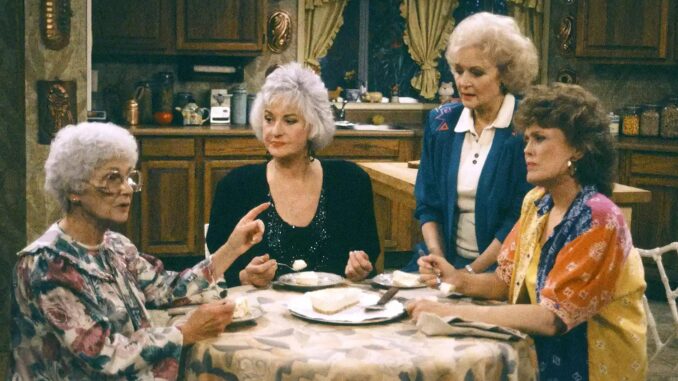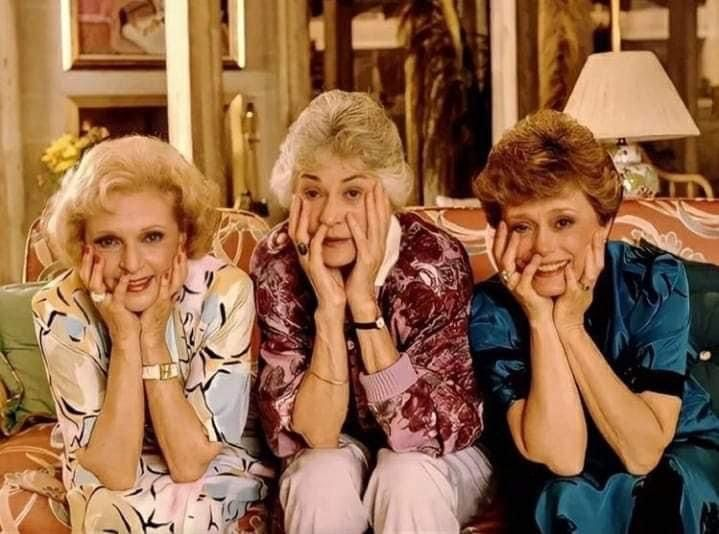
This story originally ran in 2017. We are republishing it in light of Betty White’s death on December 31, 2021, at the age of 99.

It’s February. It’s windy, and cold, and all of the holidays from now through spring are either lame or burdened with unnecessary anxiety. The world is probably on the verge of collapsing because the president’s using his phone flashlight to read classified information in the middle of his private club while surrounded with wealthy guests who don’t have security clearance. Plus, Nick Viall has turned out to be a very underwhelming Bachelor. You know what you could really use right now? A pal and a confidante. Bully for you, because at long last, all of The Golden Girls is streaming on Hulu as of today. Here are five reasons why Golden Girls is exactly what you might need right now to help pull you through these dark times.
Sitcoms are built to be soothing …
There’s a reason we tend to watch sitcoms in order to fall asleep, or as comforting background viewing, or as the thing you put on when you’re just not sure what else to watch. Sitcoms, like procedurals, are built on a deep, reassuring rhythm. There’s conflict and resolution, opening and closing, theme song and end credits. The jokes themselves tend to follow familiar beats and spaces. Golden Girls is among the best of them, the perfect combination of predictable patterns and slightly new stories. It’s like a musical theme with a remarkably deep well of familiar variations: One of the women is dating a new man. One of the women has a guest stay over. There is a household crisis (burglary, illness, house repair, financial shortfall). There is a medical event (heart attack, spasm, menopause, Alzheimer’s). One of the gang briefly considers moving out. There’s a facet of the world, political or technological or otherwise, that the women struggle to understand. Regardless, Dorothy, Rose, Blanche, and Sophia will talk about it humanely and with compassion. Things will work out. Sometimes, when it’s cold outside and everything seems terrible, you want to watch TV that you know will end well.
… but not too soothing.
At the same time, part of the special magic of Golden Girls is that its jokes and themes are both remarkably dumb and remarkably thoughtful — it’s not a show about nothing. From the distance of a quarter century, a lot of the show’s politics are significantly dated (see, for instance, every time the show tries to joke about race, homosexuality, disability, or even Blanche’s sexual appetites). But even when the show makes missteps, its fundamental interest trends toward empathy and understanding toward the things it treats as foreign. While it’s shot through with that glorious Dorothy Zbornak skepticism, Golden Girls is a show that, like the best sitcoms, prefers to use its oh-so-relaxing formal shell as a vehicle for modeling dialogue among people who disagree, tackling social issues, and presenting real, existential concerns.
Golden Girls, after all, is really a show about two things: the awareness of death and chosen families. As Sonia Saraiya wrote for A.V. Club, the show’s main characters “are hanging out in death’s waiting room, trying to figure out how to spend their time now that children, husbands, and work are more or less behind them.” And although there are familial bonds still on the show — Sophia is Dorothy’s mother, and various other family members show up occasionally — Golden Girls is really about the way people can choose to create community and form deep, committed bonds to one another, even when those relationships don’t have a formal name beyond “friend.” Beyond the very special episodes on nuclear proliferation or lesbianism (although that one is quite good), the show is surprisingly radical in its insistence that women — aging women, at that — can be their own self-determining, independent agents, unencumbered by men. (Except to fill Blanche’s physical needs, of course.)
Face some financial realities, confidently.
There are a lot of ways Golden Girls feels a bit dated. It should — it’s a comedy that premiered in 1985. Things have changed. But in at least one respect, the show feels socially evergreen: when it deals with money. There is no truer, more perpetually relevant issue facing the Golden Girls than the question of how to maintain their living situation in retirement. Their husbands, often their primary sources of income, have died. They have retirement savings, but not much. In one episode, Rose discovers that her husband’s estate was finally settled, and that she’s been left with much less than she thought.
It’s one of the ongoing tensions of the series, and it’s one of the few major sources of continuing storytelling for the show. Rose needs to find a job, which is hard for an older woman. Dorothy works as a teacher, even though she’s nominally in retirement. They share the house because they want to, but also because it’s a cost-saving measure. The show is as much a precursor to Girls as it is to the more staid, less innovative current sitcoms, except unlike Marnie, Jessa, Shosh and Hannah, the Golden Girls come at their truly treacherous financial straits with resignation and an action plan. They face things head-on, because they have done it before and they know they can do it again. They’re models of female hardiness, because they have no choice. They will make you feel like you can do it, too.
Find some new self-care suggestions.
Maybe you don’t think of a show about women in their 60s and 70s who live modestly in Florida in the late ’80s and early ’90s as offering a bounty of suggestions about how to take care of yourself, but you should. Obviously food is high on the list here — there’s the ubiquitous cheesecake, and at various times you’ll find the women gathered around the table to enjoy chocolate cake, coffee, huge hearty dinners, or a Rose Nylund specialty, clown-shaped ice-cream sundaes. More than the food itself, it’s the idea that they acknowledge the food for what it does. They’re stressed, so they eat cheesecake. It helps them feel better, and recognizing that is not a source of shame. Blanche continues to worry about cellulite, but she still eats the cheesecake.
It’s not just the food, either. Sophia rents porn, for heaven’s sake, and watches it in the living room in the middle of the day. They all play cards together. They watch movies (not just porn). They find occupations that help support them financially in their retirement, but they’re also seeking things that they find fulfilling, romantically and platonically. They live in a way that allows them to engage with the world, but they’re also firm in their self-care routines, which for Blanche involves extensive skin care and silk robes, for Rose includes lots of volunteer work and regular viewings of Miami Vice, and for Dorothy tends to revolve around singing, cynicism, and self-deprecation.
Stick it to the man.
There are good, nonpolitical reasons to watch Golden Girls. It’s wry, it’s sincere, it’s about friendship and self-worth and coping with life even when it seems impossible.
But if you’d also like a particularly pointed political reason to watch Golden Girls at this precise moment, I’ll leave you with the following thought: Can you imagine a TV show President Trump would like less than Golden Girls? What could be more horrifying to our image-obsessed leader than a show about women who build themselves a self-sustaining community that generally treats men as useless except as they can provide sexual pleasure and romantic companionship? What could be more loathsome than aging women who still think they have worth in the world? Whose bodies are imperfect and who are yet, somehow, the protagonists of their own stories?
For this reason, along with so many others, Golden Girls makes for ideal viewing right now. Your heart will be warmed. You’ll be soothed with a TV structure built to transform a story about the inevitable loneliness of old age into a comforting narrative about resilience and self-knowledge. And now, as always, Golden Girls will thank you for being a friend.
